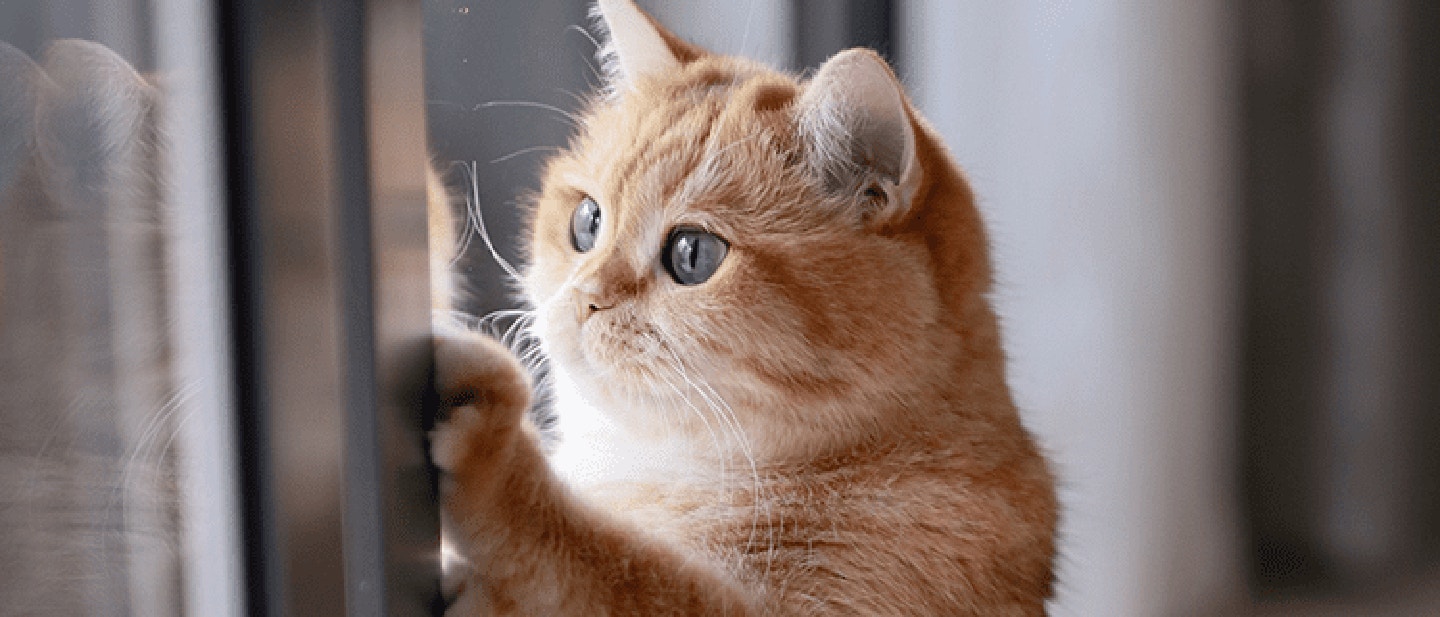
HOW TO STOP CATS FROM SPRAYING INDOORS

Article checked by a vet
While cats may occasionally have accidents outside of their litter tray for a number of different reasons, cat spraying in the house is usually a deliberate action, although there will be an underlying cause. As a cat parent, you may be wondering how to stop cats from spraying as the odour is strong, can be difficult to clean and may damage furniture. In this article, we learn more about what spraying is, what causes cat spraying and how to resolve the cause to stop cats from spraying.
Cats are very territorial creatures, which is why they often display ‘marking’ behaviours.
However, besides marking, there are other possible reasons why cats start spraying, which we explore further below.
Spraying can become problematic for owners if the behaviour is reoccurring, excessive and causing damage to furniture. Cat urine has a pungent smell, and owners will need to thoroughly clean the area to remove the odour. It’s essential to identify what's causing your cat’s behaviour in order to stop cats from spraying, and we look at possible physical or environmental causes.
Physical causes for cats spraying
Cats normally urinate horizontally in a squatting position. When a cat sprays urine, they stand and direct their urine at a specific object, whilst padding their paws on the floor and making their tail quiver. This is an instinctive behaviour. Sometimes if cats are urinating more frequently or experiencing discomfort, they may stand to urinate which can look like spraying but may actually be due to:
- Cystitis and UTIs
- Bladder stones
- Kidney disease
- Diabetes
- Thyroid problems
- Old age
- Unneutered/unspayed cat
- Oestrus (cats in heat)
Cystitis, UTIs and bladder stones may cause sudden and uncontrollable sensations to urinate, leading to accidents in inappropriate locations. Similarly, kidney disease, diabetes and thyroid problems can make your cat more thirsty, and if they are drinking more water they will need to urinate more often. If your cat is drinking or urinating more than usual, it’s important to take them to the vet.
As your cat gets older, they may be more reluctant to go outside due to feeling more vulnerable, or because of joint problems which might make it difficult for them to use the cat flap or high-edged litter trays. Your cat’s memory will also suffer with old age, so they may forget where to relieve themselves.
Whilst both male and female cats can spray, whether or not they are neutered/spayed, male cats spraying is more common if they are unneutered. Male cats start spraying to attract female cats for reproduction. Similarly, cats can spray when in heat to make their availability known to other cats. When kittens become adult cats, they experience hormonal changes which might also cause them to spray.
How to stop cats from spraying due to physical causes
There are different things you can try to stop cats from spraying, depending on the physical cause:
Consult your vet to rule out any illnesses
If your cat is urinating vertically, this could be a sign of a UTI, bladder stones or cystitis as they may have pain whilst crouching and therefore opt to stand instead. It’s essential to take your cat to the vet to see if there is an underlying medical illness causing them to spray, otherwise the problem will persist. You can also work with your vet to create a plan to alter your cat’s behaviour.
Get your cat neutered or spayed
While both male and female cats can spray, whether or not they are neutered or spayed, male cats spraying is largely due to them being unneutered. Spraying is a way for them to attract female cats in the area. Male cats can start spraying once they reach maturity around 4-5 months, although it usually starts when they are around 6-7 months. You can neuter your cat between 4-6 months to help stop them from spraying.
Help your cat as they get older
As your cat gets older, they will need more attention and assistance. If your senior cat struggles using the cat flap because of stiff joints, consider letting them out through the door instead. You should also switch to a litter tray with low sides, so it’s easier for your senior cat to use. If age is beginning to cause problems for your senior cat, you should consult a vet to check for underlying illness and discuss treatment if necessary.
Environmental causes for cats spraying
If the reason your cat is spraying is not a result of a physical or health issue, then it’s probably due to a symptom of stress from an environmental cause:
- Changes in routine and environment
- Problems with litter tray
- Multiple cats in household
- New person or pet
- Conflict with outdoor cats
Cats are creatures of habit, therefore they can easily feel anxious with sudden changes to their daily routine. A new person, pet or cat in the house might cause your cat to feel stressed. If you are redecorating the house, they may feel threatened by the absence of their scent which may prompt your cat’s spraying in the house to mark their territory again.
Cats can also feel threatened if they have ongoing conflict with outdoor cats, and therefore spraying is a way for them to mark their territory. This is part of the various pros and cons to consider when letting your cat outside. Alternatively, spraying can also occur if your cat has an issue with their litter tray, which we discuss further.
How to stop cats from spraying due to environmental causes
If your cat is spraying due to environmental causes, there are steps you can take to make your home environment more comfortable to stop cats from spraying:
Ensure the litter tray is an appropriate type and kept clean
Cats will refuse to use a dirty litter tray, which may cause them to urinate in inappropriate locations. To stop your cat from spraying or urinating outside of the litter tray, keep your cat’s litter tray clean by removing soiled litter daily and thoroughly cleaning every few days. Be sure not to use strong-smelling disinfectant, scented litter or fresheners, as this may be off-putting to your cat. CATSAN™(open in new tab) offers different options of high-quality litter for your feline friend.
If your cat’s litter tray is open, consider a lid to offer your cat more privacy. Alternatively, if your cat feels threatened by other cats in the household, you can remove the lid so they feel less vulnerable. Use litter trays with low sides for kittens and senior cats, so it’s easier for them to climb in and out.
Multiple litter trays for multiple cats
If you have multiple cats in the house, it’s important to provide a separate litter tray for each cat. If you’re not sure which one is spraying, separate your cats to help identify and then work to stop that cat from spraying by resolving the underlying problem. Take time to play with each cat so they receive plenty of direct attention from you, to avoid conflict in the home.
Maintain a calm and stress free environment
Your cat may feel threatened due to conflict with another outdoor cat. If your cat is indoors, you can close the curtains or blinds so they don’t have a direct view, which may ease their tension. You can also accompany your cat outside so they feel less insecure, and to ward off other cats.
If your cat feels anxious due to home renovations, keep your cat away from changed areas until new smells are less noticeable. You can also spread your cat’s scent around by taking a cloth and rubbing it against your cat’s paws, and then wiping it across surfaces. This will help stop your cat from spraying to spread their scent.
Cat spraying in the house can be caused by physical or environmental causes, which we’ve outlined above. It’s essential to first rule out medical illnesses with a vet, especially if your cat is a senior. Although cat spraying can be a nuisance for cat owners, this behaviour is entirely natural and instinctive for cats. Therefore, it’s important to never punish your cat for spraying as this may make things worse.
If you notice that your cat is excessively spraying, you can help manage their anxiety by being aware of and addressing underlying causes. By implementing solutions to manage your cat’s stress, it may help resolve their spraying. Read more to discover how stress can lead to other compulsive behaviours in cats, such as excessive grooming.
